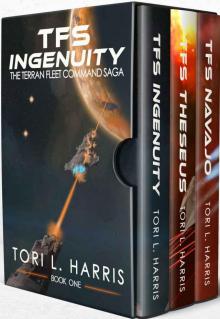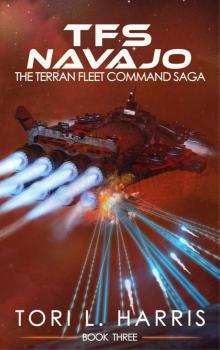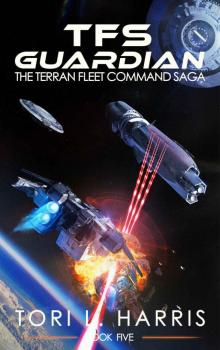- Home
- Tori Harris
The Terran Fleet Command Saga BoxSet Page 2
The Terran Fleet Command Saga BoxSet Read online
Page 2
Chapter 1
TFS Ingenuity, Earth-Sun Lagrange Point 1
(0725 UTC – 1.5x106 km from Earth)
"Captain Prescott to the bridge," the ship’s voice announced in the captain’s ready room. He had just gotten comfortable and was nearly asleep on the long couch lining the wall opposite his desk after nearly twenty hours of nonstop activity on his newly commissioned ship. While slightly irritated at the interruption, he couldn’t help but stifle a chuckle every time he heard the (female and vaguely suggestive, he thought) synthetic voice. Not only do I have the coolest damn job in the history of mankind, but my ship’s voice is hot, he thought glibly. What more could a man ask for? He had been making observations like this to himself more and more frequently of late, often having a hard time believing that any of this was real. His ship, TFS Ingenuity, was, after all, the very first vessel in Earth’s history that could actually be classified as a true starship.
Tom Prescott had every reason to feel that his life over the past couple of years had been guided inexorably to this point by a bizarre series of lucky breaks. He was a humble man by nature, with a fervent sense of gratitude, but he often wondered whether others in similar positions throughout history had felt the same way. Had Chuck Yeager or Neil Armstrong realized the enduring significance of what they were about to do? He doubted it, and figured he shouldn’t waste any time doing so either. One thing was for sure, Ingenuity was as far removed from the Bell X1 or the Saturn V as they had been in their day from a dugout canoe. Both of them (as far as he knew) had been the products of strictly Human creativity and invention. His ship was something entirely different. Not only was she infinitely more complex, but she was also the result of the first collaborative effort, of sorts, with an extra-terrestrial species. As incredible and exciting as this still seemed to him, he couldn’t help but feel a vague sense of disappointment that this miracle of engineering wasn’t a solely Human achievement.
With a concerted effort to appear more professional and alert than he felt at the moment, Captain Prescott stood and walked the already familiar ten steps to his command chair on the bridge.
"Sorry to bother you, Captain," his executive officer, Commander Sally Reynolds said apologetically as he emerged from his ready room. "Fleet Control is telling us to prepare for an immediate departure."
"Departure? Why is that? Do they need another hyperdrive calibration run?"
Although she had been officially commissioned three days earlier, Ingenuity still had a lengthy "punch list" of items requiring his crew’s attention. Most of these had been identified during her shakedown cruise over the past month. The list ranged from the simple – installing the cappuccino machine in the galley – to the incredibly complex – minute adjustments to the sensor network designed to monitor the ship’s engines during a transition to hyperspace flight.
"I don’t think so, sir. They are also requesting a secure video conference with the two of us in five minutes."
Not for the first time since his crew reported aboard, Prescott fought back the urge to make a snarky comment regarding "Fleet’s" affinity for the dramatic. Even the newly minted title "Terran Fleet Command," or TFC, seemed a little over the top for an organization in command of precisely one starship – and an unarmed one at that. He had heard, but had not been able to confirm, that the name was at least partially due to requirements imposed by Earth’s somewhat anonymous benefactor. The "ultimate gift horse" was the rather uncomfortable analogy that kept popping into his mind.
"Status, Mr. Lau?" Tom asked.
"Still holding position at L1, sir," the navigator reported promptly, turning to face his captain out of habit. "Engineering reports all systems in the green. Hyperspace transition available within fifteen minutes. Also, sir, the board is clear. No contacts."
"I would hope not, Mr. Lau, but please go right on reporting what’s on the threat board anyway. Oh, and Korwin, you don’t have to turn around and look at me when you have something to say. I appreciate the courtesy, but it’s more important for you to keep your eyes on the road. Just be sure to speak up so we can hear you while you are looking in the other direction."
"Yes, sir, sorry about that," Lieutenant Lau replied rather sheepishly, but with a boyish grin on his face. Every member of Ingenuity’s crew was hand-picked from a huge pool of volunteers representing the absolute best that each member nation of TFC had to offer. Like their captain, each of them was also amazed to some extent at their monumental good fortune in being selected.
"Commander, I guess we had better go have a chat for a minute before this call, huh?" Prescott rose without waiting for a reply and headed back in the direction of his ready room.
"Lieutenant Lau, you have the bridge," Commander Reynolds ordered automatically as she followed her captain. "Notify Engineering to expect a hyperspace transition within the hour." As she turned her back to the ship’s small bridge, an already well-rehearsed choreography took place. Lieutenant Lau was relieved in his position at the Navigation console by one of the two other officers who immediately emerged from the "lounge" opposite the captain’s ready room. Before the captain and XO had even left the room, each of Ingenuity’s five required bridge positions was crewed and ready.
"Well, sir, one thing about a fleet that only has one ship," Reynolds said as they reached the privacy of the ready room, "if they weren’t busy being a nuisance to us, what else would they have to do with their time?"
"True enough, and I guess we shouldn’t have expected anything else under the circumstances, but the timing of this message seems a little odd to me." Like most experienced officers, Prescott was a bit of a stoic where the motivations of his military and political betters were concerned. "They know that everything we have been doing for three months has been regimented and scheduled almost to the minute. Now they throw an unscheduled hyperspace transition at us forty-eight hours before we are fully operational? It just seems a little odd, that’s all."
"Maybe E.T. phoned home again," Reynolds quipped as she seated herself at the conference table opposite the large view screen that made up the outside wall of the ready room.
"God, I hope not," Prescott moaned, uncharacteristically rolling his eyes. "Well, let’s stop speculating and find out what the latest crisis is, shall we?" Retrieving the tablet from his desk, he called up the secure video feed from Fleet’s (also brand new) Near Earth Real-time Data network.
Of all the amazing toys his planet had been surreptitiously gifted over the past several years, the NRD network was one of his personal favorites. Predictably enough, it was lovingly referred to as "NERD net" by just about everyone who ever used it in a sentence. In spite of the rather inane acronym, however, the technology was truly incredible. Like most of the other advances the mysterious data streams from space had offered, Humans were probably at least a century away from creating anything approaching its capabilities without outside help. Prescott, in spite of his PhD in Aerospace Engineering and Master of Science in Applied Physics, had only a general idea of how it actually worked. His understanding was that the NRD comm array, mounted amidships on Ingenuity’s ventral surface, was used to access a network of communications beacons permanently deployed in hyperspace. The array, as well as the beacons themselves, utilized technology similar to his ship’s hyperdrive engines to provide for the near instantaneous transmission of high bandwidth data streams to any location within one light year of Earth.
The implications of this were almost as colossal as faster-than-light, or FTL, travel itself. At the moment, it meant that his vidcon with Fleet could proceed without the usual annoying delays associated with the signal traveling at a glacial three hundred thousand kilometers per second back and forth to Earth. Even sitting in his planet’s own backyard at Lagrange point 1, traditional, radio-based communications signals would normally be delayed by roughly five seconds each way, rendering conversations awkward but still possible. During calibration runs of Ingenuity’s hyperdrive, however, she had traveled to the
outer reaches of the solar system. While the ship ran "wind sprints" out to near the orbit of Pluto, video and telemetry feeds of the entire mission had been streamed back to Earth in real-time. At that distance, a one-way transmission to Earth that would have originally taken over five hours arrived as if the ship was sitting in low earth orbit. In terms of command and control, it was truly revolutionary technology.
One unfortunate limitation, however, rendered communications impossible while ships traveled at faster-than-light speeds. The design required individual comm beacon nodes to remain stationary at a precisely defined position in hyperspace. Since it was generally agreed that starships should remain mobile while communicating, their comm arrays were designed to simply forward data to the nearest network node. From a practical standpoint, this meant that a ship was required to transition back to normal space before it could reestablish communication with the network. Over time, it was hoped that increasing starship speeds and expansion of the network would lessen the impact of this limitation. There were already plans to begin deploying additional comm beacons as Fleet ships started the process of exploring nearby star systems.
Prescott’s reflections were interrupted as Terran Fleet Command’s official service seal appeared on the screen, followed a few seconds later by the careworn face of Admiral Kevin Patterson, Chief of Naval Operations.
"Good morning to you both," the CNO greeted. "This vidcon is classified Top Secret, code word MAGI. Your ready room has been automatically secured for this briefing."
"Understood, Admiral, and good morning to you as well," Prescott replied, sounding a bit more tired than he would have liked.
"MAGI" was the aptly applied code word designating any information related to Extra Terrestrial Signals Intelligence, or ETSI. Just about everyone on planet Earth was now aware that the existence of intelligent alien life had been confirmed beyond a shadow of a doubt, although there were many who stalwartly refused to believe that it was actually true. In fact, even those who embraced the idea of communicating with an alien race tended to be blissfully unaware of the sweeping implications for their world.
The signals had been arriving now for nearly fifty years and appeared to originate from hundreds of different star systems. Although the data streams were not encrypted per se, their content was of little use to the casual listener. In fact, detailed transcripts of the data were now available on hundreds of publicly accessible websites. For the most part, however, the information was of such an esoteric nature that open access was of little consequence. The true secrets associated with the ETSI data streams were known to only a select few.
"I’ll come straight to the point, Tom," Patterson continued. "As you know, we have deployed thousands of surveillance drones to hopefully give us a heads up of any alien activity in our neighborhood. A little over an hour ago, we detected a number of very large explosions near Jupiter’s orbit on the opposite side of the sun from our current position. The closest drone was about ten light minutes away from the activity, but the data was transmitted back to Earth via NRD net, so we had the opportunity to get some assets pointed in that direction in time to take a look. Here’s what we saw." Admiral Patterson’s image retreated to the top right corner as a starfield filled the majority of the large screen. The image distorted repeatedly as the surveillance satellite adjusted its optics in an effort to find whatever was in the area prior to the explosions. Suddenly, a single ship loomed large in the display before the image distorted again and zoomed out to reveal a formation of at least ten individual ships.
"What the hell?" Reynolds gasped, briefly losing her normally unflappable military bearing.
"What the hell indeed, Commander Reynolds," the CNO answered without skipping a beat. "Keep watching, you haven’t seen anything yet." The satellite had been given instructions to capture as much detail as possible of whatever was in the area prior to the time of the explosions. The video was being played in slow motion, which provided nearly two minutes of footage as the camera focused and panned across each ship in the formation. There appeared to be a total of twelve. They weren’t what you would call beautiful by any stretch, their hulls portraying a rather boxy, utilitarian look. They gave the impression of being huge, however, even though there was nothing to provide a sense of scale in the video feed.
"Are we assuming that all those things that look like guns on the big ones are indeed guns, Admiral?" Captain Prescott asked with more good humor than he felt at the moment.
"They sure look like guns to me, Tom," Admiral Patterson grumbled, "and I don’t know why we would assume otherwise at this time. You’ll see the good news on that subject shortly, if I can call it that."
Each of them returned their attention to the video feed, which had zoomed out to once again reveal the entire formation of ships. As if the appearance of this small fleet of ships within their own solar system wasn’t surprising enough, they knew from the admiral’s comment that something even more extraordinary was about to occur. Captain Prescott thought he saw a tiny flash of light appear just above the formation a fraction of a second before every single ship on the screen exploded simultaneously. "Dear God!" was the only thing he was able to say for several seconds while he struggled to process what he was seeing.
The video froze momentarily, then displayed a split screen with close-ups of two of the larger ships before beginning a playback loop of the incident. The effects of whatever weapon was being used was remarkably similar in both frames. Unlike most Sci-Fi movies Tom had ever seen, the ships didn’t vaporize in a spectacular expanding ball of plasma. Instead, the explosions, while clearly huge, were more localized to specific locations on the ships. It was more like what you would expect to see if a giant cutting torch burned its way from one side of the hull to the other in a split second, literally slicing the ships in two and sending each half spinning off in different directions. Secondary explosions were clearly visible as the sections rotated toward the camera before exiting the field of view.
Prescott and Reynolds stared at the screen in stunned silence as the admiral continued. "I really don’t even know where to begin, other than to tell you that analysis of all this data is underway, but it will take some time as you can imagine. We’ve been getting MAGI data now for fifty years, so all of us knew that something like this would probably start happening at some point, but there was obviously no way for anyone to know what to expect. The data we have been getting over the past several years has greatly improved our situational awareness, at least within the solar system, but we are clearly not yet prepared to defend the planet against any sort of alien attack."
"They don’t want us to be able to defend ourselves?" Reynolds asked, surprised to be hearing MAGI data discussed in such a general way.
"Let me rephrase. Whoever is sending the data seems almost paternalistic towards us. It’s almost like a father who wants to take his son hunting for the first time, but doesn’t believe he’s quite ready for the responsibility of carrying his own rifle, if that makes sense."
"I suppose it does, but did they come right out and say, ‘Sorry, kids, no weapons for you?’"
"Not exactly, Commander," he laughed. "The data we receive often includes engineering specifications and blueprints that are crafted specifically for our benefit, or, if not ours, then some other humanoid species that just happens to be about our size, has our level of technological knowhow, and speaks English," Patterson said with a wry smile. "Those blueprints almost always include what I would describe as ‘terms and conditions’ documents that read a lot like legal contracts. One of the common threads we see over and over again are exhortations against the weaponization of any technology we borrow from the data."
Prescott’s eyebrows went up. "Borrow, sir?"
"Oh yes, Captain. As I said, some of the documentation they provide looks like it comes straight out of our Judge Advocate General’s office. They make it very clear that they are granting us limited use of their technology, not ownership of it. They also ap
pear to be willing to enforce the terms of our implied contractual agreement, if necessary. As I’m sure you surmise, the merits and potential pitfalls of using this data has been debated now for decades. Given that whoever our patron is must be hundreds, if not thousands of years more advanced than we are, we have endeavored to be in strict compliance with their requirements from day one."
"That seems reasonable, but I have never understood their motivation to provide the data at all. What’s in it for them?" Reynolds asked.
"As to that, there are a great many theories. I’d say the prominent one is that the dominant military power brokers in this part of the galaxy are essentially too big, and perhaps too civilized, to fight each other directly, so they maintain a balance of power through technology sharing with proxy species. It’s similar to how the United States and the Soviet Union handled things during the second half of the twentieth century. Everyone knew that a war between the two major superpowers, who were armed to the teeth with nuclear weapons, would have been counterproductive for pretty much everyone on the planet. So as a sort of substitute for all-out conflict, both nations conducted limited warfare around the globe using ideologically compatible proxies."
Admiral Patterson checked himself, briefly glancing at his watch before continuing. "I know that both of you are cleared for some aspects of MAGI signals intelligence, but I also know that you are hearing some of this for the first time. So I apologize for cutting our discussion short, but I still haven’t shared the reason you were told to expect an immediate departure. Shortly after we witnessed the destruction of those ships, we received the following message."
Once again, the video screen changed, this time displaying text formatted as a "Flash" priority action message:
Z0705

 The Terran Fleet Command Saga BoxSet
The Terran Fleet Command Saga BoxSet TFS Ingenuity: The Terran Fleet Command Saga – Book 1
TFS Ingenuity: The Terran Fleet Command Saga – Book 1 TFS Navajo: The Terran Fleet Command Saga – Book 3
TFS Navajo: The Terran Fleet Command Saga – Book 3 TFS Guardian: The Terran Fleet Command Saga – Book 5
TFS Guardian: The Terran Fleet Command Saga – Book 5 TFS Theseus: The Terran Fleet Command Saga – Book 2
TFS Theseus: The Terran Fleet Command Saga – Book 2